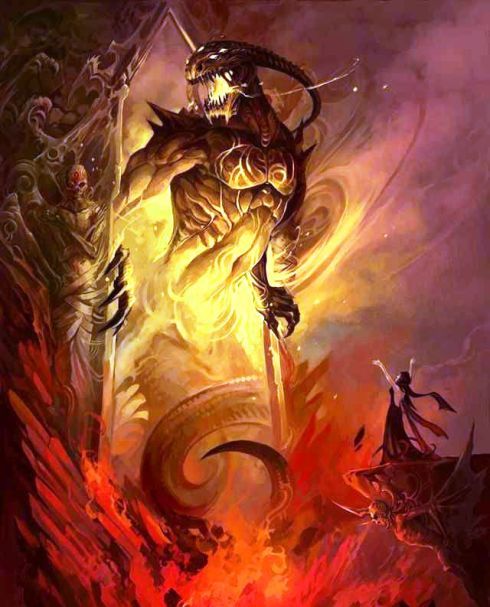Devil
Devils are malicious, sadistic supernatural beings who dwell largely within the Nine Hells, one of the Lower Planes of Existence. They are unlike demons in that they aren't the twisted souls of the damned, but rather creatures who turned against Yahweh and were thence cast out from Heaven. The greatest of their number is named Satan, though he is variously known by other names, such as simply "the Devil," Ahriman, Dispater or Lucifer, though these are but a few.
Contents
In this context, the term "devil" predominantly refers to the infernal cohorts of Satan, who were consigned to the depths of hell following their defeat during the War in Heaven. This was a significant event in various religious and mythological narratives, including Christian literature. Satan's minions, often referred to as demons or fallen angels, are condemned to supervise the damned in Hell until the end of time.
Behaviour
While their designated role in the universe is to inflict suffering and deceive the hapless souls in their care, these genuinely malevolent beings possess a disturbing appetite for their malefic tasks. Still, beyond the confines of Hell, they are perceived as instruments of retribution and divine justice, as those condemned souls who find themselves in the abyss are seen as rightfully placed there.
However, most devils harbour an attitude that the souls they're granted to torment are far from sufficient in number to satiate their desires. From their perspective, the only conceivable means to rectify this perceived imbalance would be to subject the soul of every being, whether righteous or wicked, living or deceased, to their twisted whims and cruel devices. This perspective sheds light on just how eager devils would be to sow discord if they were liberated to roam the realms of the Earth — a grim possibility that, unfortunately, they occasionally obtain.
Advantages
All devils, regardless of their type, possess a set of innate abilities that they can employ effortlessly, each requiring no more than 1 action point (AP) to activate, and they can use these abilities as frequently as they desire. However, they can only employ one such ability per round, so they are judicious in selecting the most advantageous choice.
Magic. These creatures can invoke a range of effects resembling various spells, without the need for traditional spellcasting. These effects include suggestion, know intent, cause fear, animate dead and the detailed abilities below:
- Darkness. Devils can generate an encompassing darkness, which they like to create to conceal their position from round to round. Their exceptional ability to see perfectly in such darkness is granted by a continuous ultravision.
- Teleport. They frequently exploit their teleportation capability, allowing them to traverse the battlefield with ease, often transitioning from place to place more swiftly than traversing a single hex. A favored tactic involves attacking a nearby adversary, teleporting, and then launching further attacks against other foes across the field with their remaining movement.
Gate. When faced with dire circumstances in combat, devils possess the power to summon reinforcements of their own kind through a mystical gate. However, they dislike sharing their intended victims with their fellows, preferring instead to yield ground and return to Hell, achieved simply by teleporting again, rather than summoning additional devils to join the fray.
Magic to Hit. Devils are only hit by magical weapons.
Natural immunities. They also exhibit immunity to cold-based, gas-based and fire-based attacks, including both normal and magical. Devils are impervious to charmed, sleep or any form of mental manipulation. Their minds cannot be touched by ESP and their intentions cannot be known. Even augury and divination spells cannot predict their movements or designs; though other forms of divination might.
Number
According to the Ars Goetia there exist 72 entities known as "arch-devils" or demon princes. These beings are revered as potent and malevolent entities within occult traditions. Certain practitioners of dweomercraft engage in the study and contact of these entities, seeking knowledge or assistance to fulfill their diverse goals.
Among the infamous arch-devils are demi-gods such as Asmodeus, Baalzebub and Geryon, alongside other formidable beings called "greater devils." This group encompasses horned devils, ice devils and pit fiends. In addition, there exists a multitude of lesser devils who pose relatively diminished threats, yet they obediently follow the directives issued by their mightier counterparts. These include barbed devils, bone devils, lemure and Styx devils.
Misconceptions
Over countless millennia, a multitude of folklore and tales have emerged, suggesting that devils can be manipulated by means that don't apply to other creatures. For example, the notion that knowing a devil's name somehow give the speaker power over the creature. These fabrications are crafted to advantage foolish and superstitious persons, who seek out talismans and all forms of nonsensical clap trap in order to protect themselves. However, no mere trinket, whatever might be carved upon it, can rescue an ordinary person from a devil's wrath.
Devils are impervious to the deterrent effects of holy symbols or common relics, unless these have been reworked into a magic item designed to provide a special defense against these creatures.
See also,
Bestiary
Chthonic
Protection from Malevolence (spell)
